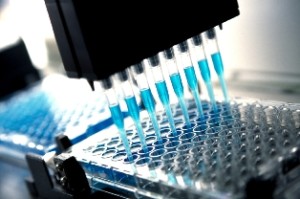 When most people think of the biotechnology field, they picture scientists working in Petri dishes for the next cancer treatment, but did you know that there are numerous types of computer science jobs in biotechnology as well? Biotechnology at its heart is a broad discipline that looks at biological processes in order to develop new tools and technologies to fight diseases. With the vastness of the human genome only truly decodable by powerful computers, understanding the data structures and programming that computes the reams of information out there is a high growth field.
When most people think of the biotechnology field, they picture scientists working in Petri dishes for the next cancer treatment, but did you know that there are numerous types of computer science jobs in biotechnology as well? Biotechnology at its heart is a broad discipline that looks at biological processes in order to develop new tools and technologies to fight diseases. With the vastness of the human genome only truly decodable by powerful computers, understanding the data structures and programming that computes the reams of information out there is a high growth field.
Computational Biology
Computational Biologists are often referred to as the next pharma scientists, according to the American Association for the Advancement of Science. It is a dual discipline field of computer science and biology. Pharmaceutical companies know that the answer to many of life’s secrets lie inside the enormous amounts of genetic data. People that are skilled in bioinformatics can far surpass the data that an Excel spreadsheet can hold and are able to comb through years and years of experimentation, trial and error and find links to genes and diseases that 20th century biology just could not do. It’s also important to note that it isn’t really the larger companies that are driving growth in this field. Since it’s far cheaper to do pre-work via computation versus experimentation, smaller biotechnology firms are increasing turning to computer science professionals and not run of the mill biologists.
What Careers Are Out There
According to Byte Size Biology, there are really three types of computer science careers in the field of biotechnology. The first is the researcher. Researchers almost always have attained a high level of education and have Ph.D.s in things like biology, computer science or physics. These professionals generally work in academic or government settings and spend most of the time grant writing and running research labs. Analysts is the next type of careers. They analyze data for scientists. Analysts have strong skills in statistics and spend a lot of their time answering key questions from experiments. Finally there are engineers, the most closely related career to computer science. These are the people who write the software that the analysts and researchers use. They live and breathe software analytics, algorithms, programming and data structures. If this is the path you choose you will be building the tools and infrastructure that supports the computational biology field.
In addition to the jobs available, there are three job structures to note. Centralized structures have computational scientists working in large R&D or IT departments. Consultants are farmed out to a specific specialty or research program when their skills are needed. Decentralized models are appealing to the computer science professional who has a desire to work on a specific area of the medical research field indefinitely. The third type of structure is sort of a hybrid of the previous two. While a central core of computer scientists exist and are farmed out, you can also find a position working on a specific team for extended periods of time.
Related Resource: Objective C
Conclusion
There is a wealth of data out there in this field of study, but having the right training and the right desire to solve problems can lead to a promising career in one of the numerous types of computer science jobs in biotechnology.